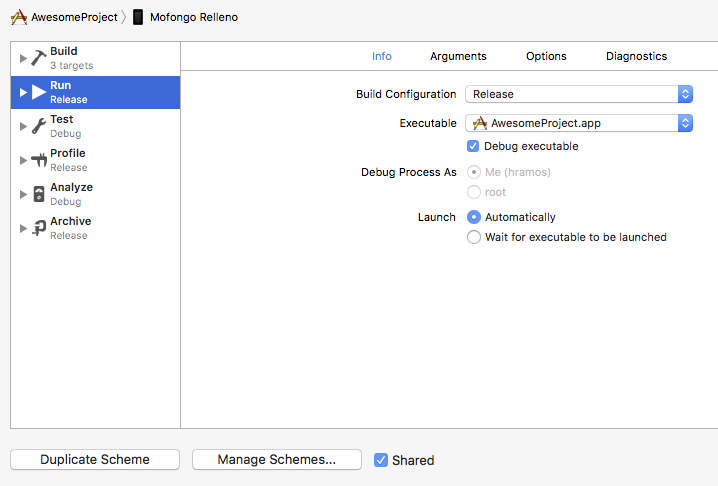上架 App Store
上架应用的过程和任何其它原生 iOS 应用一样,但有一些额外的注意事项要考虑。
If you are using Expo then read the Expo Guide for Building Standalone Apps.
1. Enable App Transport Security
App Transport Security 是 iOS 9 引入的一项安全特性,拒绝不通过 HTTPS 发送的所有 HTTP 请求。这会导致 HTTP 传输阻塞,包括开发者 React Native 服务器。为了使开发容易,在 React Native projects 里 ATS 默认为localhost禁用。
You should re-enable ATS prior to building your app for production by removing the localhost entry from the NSExceptionDomains dictionary and setting NSAllowsArbitraryLoads to false in your Info.plist file in the ios/ folder. You can also re-enable ATS from within Xcode by opening your target properties under the Info pane and editing the App Transport Security Settings entry.
If your application needs to access HTTP resources on production, see this post to learn how to configure ATS on your project.
2. 配置 release scheme
需要在 Xcode 使用Release scheme 编译在 App Store 发布的 app。Release版本的应用会自动禁用开发者菜单,同时也会将 js 文件和静态图片打包压缩后内置到包中,这样应用可以在本地读取而无需访问开发服务器(同时这样一来你也无法再调试,需要调试请将 Build Configuration 再改为 debug)。
由于发布版本已经内置了 js 文件,因而也无法再通过开发服务器来实时更新。面向用户的热更新,请使用专门的热更新服务。
要配置 app 为使用Release scheme 编译,请前往Product → Scheme → Edit Scheme。选择侧边栏的Run标签,然后设置下拉的 Build Configuration 为Release。

关于启动屏的优化技巧
随着 App 包大小的增长,可能开始在启动屏(splash)和根应用视图显示之间看到白屏闪现。如果是这样,为了在转换期间保持启动屏显示,可以添加下列代码到AppDelegate.m。
// Place this code after "[self.window makeKeyAndVisible]" and before "return YES;"
UIStoryboard *sb = [UIStoryboard storyboardWithName:@"LaunchScreen" bundle:nil];
UIViewController *vc = [sb instantiateInitialViewController];
rootView.loadingView = vc.view;
The static bundle is built every time you target a physical device, even in Debug. If you want to save time, turn off bundle generation in Debug by adding the following to your shell script in the Xcode Build Phase Bundle React Native code and images:
if [ "${CONFIGURATION}" == "Debug" ]; then
export SKIP_BUNDLING=true
fi
3. 编译发布 app
现在可以通过点击⌘B或从菜单栏选择 Product → Build 编译发布 app。一旦编译发布,就能够向 beta 测试者发布 app,提交 app 到 App Store。
You can also use the
React Native CLIto perform this operation using the option--configurationwith the valueRelease(e.g.npx react-native run-ios --configuration Release).